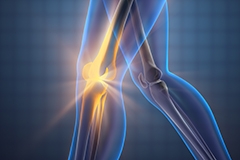6 Most Common Knee Injuries
Medically Reviewed by Patrick K. Denton, MD
As the largest joint in our bodies — one that flexes 5 thousand to 10 thousand times a day — it’s not surprising that the knee is one of the most injured and most easily injured joints.
“The knee joint has five major components,” says McLeod Orthopedic Surgeon Dr. Pat Denton. “And each of those components – bones, cartilage, meniscus, ligaments and tendons – can be injured in itself or in conjunction with other components.”
First, some brief definitions of the components:
- Bones — the kneecap (Patella), thigh (Femur) and shinbone (Tibia) – create the primary structure.
- Tendons connect muscles to the bones.
- Ligaments connect the bones to each other. Cruciate ligaments are inside the knee joint guiding the back and forth motion and provide stability, while collateral ligaments are connected on the outside, helping manipulate sideways motion.
- Meniscus – a strong, rubbery substance — acts as wedge-shaped shock absorbers between the thigh and shinbone.
- Cartilage acts as slippery lubrication to smooth the movement of the joint.
Here are the 6 most common injures that can occur to the many working parts of the knee joint.
Fractures. Falling from a height or an auto collision cause can damage the bones, possibly fracturing them. A cast may be involved as the bones heal themselves. In some cases surgery may be needed to hold the bones aligned until they heal.
Dislocation occurs when the bones don’t necessarily break but are pushed out of alignment, from a fall, auto accident or through sports. For example, you can dislocate your knee cap.
Tendon Tears. Attempting to lift heavy items, jumping or squatting could place enough stress on the tendons to tear them or pull the tendon away from the muscle and bone. Middle-aged weekend athletes falling on their knee or landing inelegantly can experience a torn tendon.
Ligament Injuries. A sudden change of direction or twisting motion can shred an anterior cruciate ligament (ACL), an injury more common in young women than men and more common than injury to the collateral ligament. The nature of these injuries – like torn rubber bands – requires replacing the torn ligament rather than simply stitching it together as a treatment.
Torn Meniscus. Turning to hit a racquetball or tennis ball causes the knee to bend and twist. Too much can displace or injure the meniscus. Taking a hit to the side of knee in contact sports might also injure the meniscus.
Cartilage can wear out from use over the years and lead to osteoarthritis. It differs from other knee injuries, because this wear-and-tear occurs over a long time not from an immediate traumatic accident. Eventually, it may require a knee joint replacement.
ACTIONS YOU CAN TAKE
Treat any injury immediately with R-I-C-E (Rest, Ice, Compression, Elevation). If the pain is severe or sustained, see an Orthopedic Specialist to diagnose the problem and talk with you about treatments.
For some types of injuries, such as the ACL tear, you can undertake special activities to help prevent them.
Find an Orthopaedic Specialist near you.
Sources include: McLeod Health, American Academy of Orthopaedic Surgeons, National Institutes of Health, Arthritis Foundation
-
McLEOD REGIONAL MEDICAL CENTER FLORENCE
843-777-2000 -
McLEOD DARLINGTON
843-777-1100 -
McLEOD DILLON
843-774-4111 -
McLEOD LORIS
843-716-7000 -
McLEOD SEACOAST
843-390-8100 -
McLEOD CHERAW
843-537-7881 -
McLEOD CLARENDON
803-433-3000



-
McLEOD REGIONAL MEDICAL CENTER FLORENCE
843-777-2000 -
McLEOD DARLINGTON
843-777-1100 -
McLEOD DILLON
843-774-4111 -
McLEOD LORIS
843-716-7000 -
McLEOD SEACOAST
843-390-8100 -
McLEOD CHERAW
843-537-7881 -
McLEOD CLARENDON
803-433-3000
 Find a Doctor
Find a Doctor  Locations
Locations  Services
Services 